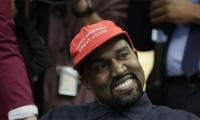ISLAMABAD: The Israeli and UAE foreign ministers inaugurated Sunday direct phone services between the two countries in their first announced call after an agreement to normalise relations, said an Emirati official.
The UAE’s Sheikh Abdullah bin Zayed Al-Nahyan and Israel’s Gabi Ashkenazi "inaugurated a phone link between the United Arab Emirates and the state of Israel, and exchanged greetings following the historic Peace Accord signed by the two countries," tweeted Hend al-Otaiba, director of strategic communications at the UAE’s foreign ministry.
Shortly after, Ashkenazi tweeted that the two "decided together on the establishment of a direct communication channel ahead of the signing of the normalisation agreement between the two countries and... to meet soon".
Phone links for the public were also functioning between the two countries, international media reported. The Israel-UAE deal, announced by US President Donald Trump on Thursday, is only the third such accord Israel has struck with an Arab country, and raises the prospect of similar deals with other pro-Western Gulf states. Trump said leaders from the two countries would sign the agreement at the White House in around three weeks.
Under the deal, Israel pledged to suspend its planned annexation of West Bank territories, a concession welcomed by European and some pro-Western Arab governments as a boost for hopes of peace.
But Prime Minister Benjamin Netanyahu stressed Israel was not abandoning itsplans to one day annex the Jordan Valley and Jewish settlements across the occupied West Bank.
The Emirati APEX National Investment company also signed a “strategic commercial agreement” with Israel’s Tera Group to cooperate on research and development related to COVID-19, including a testing device, the UAE’s state news agency WAM said.
The deal “is considered the first business (deal) to inaugurate trade, economy and effective partnerships between the Emirati and Israeli business sectors, for the benefit of serving humanity by strengthening research and studies on the novel coronavirus,” WAM quoted APEX’s chairman Khalifa Yousef Khoury as saying. The agreement was signed at a press conference in Abu Dhabi.
Meanwhile, Netanyahu said in an interview on Sunday that he has been speaking with leaders from Arab countries in addition to the UAE following the American-mediated peace deal. He stated that he spoke with political leaders in Oman and "other countries," and that the key to such discussions is discretion.
“We are making history, and we are changing history," Netanyahu claimed. "It is good for the United States and it is good for Israel." "This is peace of the strong and I think peace of the hopeful for the future," Netanyahu said. He later spoke about the current regional tensions surrounding Iran and stated, "Iran is committing murder... throughout the Middle East. It's everywhere, sowing mayhem."
Netanyahu then criticised the UN' decision not to extend the Iran arms embargo, as pushed forth by the US. Meanwhiule, the UAE summoned Iran’s charge d´affaires in Abu Dhabi to protest "threats" by the Islamic republic’s president over the Emirati decision.
The foreign ministry "summoned the Iranian charge d´affaires (and) handed him a strong note of protest against the threats contained in Iranian President Hassan Rouhani´s speech regarding the UAE´s sovereign decisions," the official WAM news agency reported. That came a day after Rouhani said the UAE´s decision to normalise ties was a "big mistake" and warned "against opening the path of Israel to the region".
Without expanding on what that would mean, he said it "would be another story and they will be dealt with in another way," Iran’s Mehr news agency reported. UAE said on Sunday that such rhetoric "was unacceptable and inflammatory and had serious implications for security and stability in the Gulf region."
Bahrain and Oman could be the next Gulf countries to follow the United Arab Emirates in formalising ties with Israel, Israel’s intelligence minister said on Sunday. “In the wake of this agreement will come additional agreements, both with more Gulf countries and with Muslim countries in Africa,” Intelligence Minister Eli Cohen told Army Radio.
Kasuri urged authorities of Pakistan and China to pull their resources to defeat forces seeking to disrupt the...
IHC said that several people had not returned the cipher copies they had, and asked if it meant it was right for the...
Gilani gave floor to Leader of Opposition Syed Shibli Faraz, who insisted that with unity they could take country...
Match witnessed intense action and dramatic twists, keeping fans on the edge of their seats until the final ball
Apex court bench was reconstituted after Justice Yahya Afridi recused himself from hearing the case earlier this month
ECP issued a notification in this connection pursuant to orders passed by LHC







